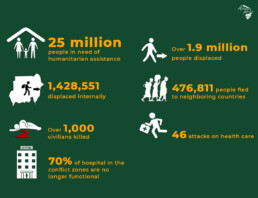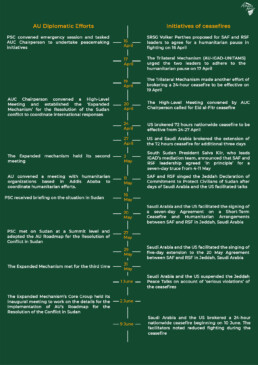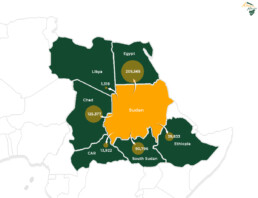Briefing update on situation in the Horn of Africa
Date | 15 June 2023
Tomorrow (15 June), the African Union (AU) Peace and Security Council (PSC) will convene its 1158th session to receive briefing update on the situation in the Horn of Africa. The briefing is expected to focus on the conflict in Sudan and its regional implication, and the implementation of the Pretoria Comprehensive Cessation of Hostilities Agreement in Ethiopia.
The session commences with opening statement from Sophia Nyamudeza, Permanent Representative of Zimbabwe to the AU and Chairperson of the PSC for the month of June, while Bankole Adeoye, AU Commissioner for Political Affairs, Peace and Security (PAPS) is expected to make remarks. Olusegun Obasanjo, Nigeria’s former President and AU High Representative for the Horn of Africa will brief members of the PSC. The representatives of Ethiopia, the Inter-Governmental Authority on Development (IGAD) Secretariat, the United Nations (UN), and the European Union are also expected to deliver statements during the session.
On Sudan
The last time PSC met on the situation in Sudan was at its 1156th session on 27 May, which was held at the level of Heads of State and Government. In that session, the PSC adopted the AU Roadmap for the Resolution of the Conflict in Sudan that identifies six priority areas for AU engagement towards silencing the guns in Sudan.
Coming on the heels of 14th ordinary session of IGAD Heads of State and Government, held on 12 June in Djibouti, PSC members are likely to be interested to be briefed on the major outcomes of the summit and how it reframes diplomatic efforts for peace in Sudan. It has emerged from the summit that IGAD adopted a new roadmap for peace in Sudan whose action plans include to expand the IGAD High-Level delegation for Peace in Sudan, which was formed at the 40th extraordinary IGAD summit, held on 16 April, to give space for Ethiopia and establish a quartet with Kenya assigned with the role of chairing the quartet. Kenya’s President William Ruto, who is the chair of the quartet, also announced the plan to convene a face-to-face meeting between the quartet and the leaders of the belligerents within ten days.
This plan involves an exercise in claiming and asserting leadership role by IGAD in the search for resolution the new conflict in Sudan. In doing so, this plan, while not opposed to the US-Saudi or the AU initiatives, seeks to establish another platform and peace process. This peace processes, if not rationalised with other existing or emerging processes under US-Saudi or the AU, will be the third peace process. It would thus have the effect of not only multiplication of processes but also if successful can displace the AU’s Roadmap and the envisaged roles of the Expanded Mechanism as well as its Core Group.
It is to be recalled that the 20 April High-Level meeting convened under the auspices of the Chairperson of the AU Commission established the Expanded Mechanism to serve as the main platform to coordinate and consolidate international responses towards the conflict. As the Mechanism is so expanded in its nature, a ‘Core Group’ with smaller number of actors was established pursuant to the AU Roadmap for the Resolution of the Conflict in Sudan for effective action. If conflict and competition between the two processes is to be avoided, there is a need for the PSC to revise the AU Roadmap.
In terms of the regional implications, the lack of progress in the diplomatic efforts for containing the war makes it increasingly worrisome to neighbouring countries. On 15 June, Sudan marks the second month of the conflict, leaving 25 million people – about half of the population of the country – in need of humanitarian assistance. (See below the infographic on the humanitarian consequences of the conflict).

Infographic 1: Humanitarian crisis of the conflict in Sudan and attacks on civilian infrastructures
Source: IOM, UNICEF, WHO, and UNHCR
Despite plethora of diplomatic initiatives to end the conflict, the conflict has continued unabated, causing enormous suffering to civilians and damage to the state infrastructure. Thus far, nearly a dozen ceasefire declarations and agreements have been announced. Some of these ceasefires brought brief respite, allowing evacuation of diplomats and foreign nationals and limited flow of aid, but almost all of the ceasefire initiatives have failed to take hold, including the most recent ceasefire brokered by Saudi Arabia and the US on 9 June.

Infographic 2: Timeline of AU engagement and ceasefire initiatives
Source: Amani Africa’s tracker of diplomatic efforts on Sudan conflict
The impact of the ongoing conflict in Sudan will not be limited to the country, but also has the potential of convulsing the wider region given the geographic location of the country that borders seven countries, most of which are in fragile context. It is within this light that the agenda of tomorrow’s session is framed although the ripple effects of the conflict will be strongly felt even beyond the Horn of Africa, particularly in those countries which borders Sudan to the west, namely Central African Republic (CAR) and Chad.
The ripple effect of the conflict could manifest at least in three ways. The first is in terms of the refugee crisis that the conflict triggered, placing strain on the neighboring countries’ overstretched resources that are grappling with their own humanitarian crisis. IOM, UNHCR and government sources provide that around 476,811 people have fled to neighboring countries as of 4 June, some of them are in fact people displaced by internal crisis in their own countries. The influx of refugees to the neighboring states may fuel ethnic tensions in some context. The disruption of cross border trade because of the conflict is also resulting in food price increases in some countries such as South Sudan, Chad, and CAR.

Infographic 3: Number of people fleeing to neighboring countries
Source: IOM, Sudan Response Situation Update, 6 June 2023
Second, the conflict in Sudan not only risks a spillover into surrounding countries but also could morph into a regional conflict with the high possibility of dragging in its neighbors into the conflict. For the time being, most of the neighboring states seem to have adopted a neutral posture and even some of them offering mediation between the warring parties, but this could change as the conflict becomes protracted and spread closer to their borders. The controversy between Egypt, Ethiopia, and Sudan over the Grand Ethiopian Renaissance Dam (GERD) and the border dispute between Ethiopia and Sudan over al-Fashaga (a contested territory controlled by Sudan during the Tigray conflict) are some of the dynamics raising the fear of regional spillover. For South Sudan, the conflict has direct economic consequences, which is dependent on Sudan for its oil export – the main source of revenue for the country.
Sudan is also a country where Islamist movements are very active. As a country that in the past hosted the late Al Qaida leader Osama bin Laden and sharing a border with Sahel, a state collapse in Sudan will create a vacuum that would be most attractive to terrorist groups both from the Sahel and Horn of Africa and outside of Africa as well.
As the expansion of the conflict towards Darfur looms large, the immediate spillover risk could be for countries west of Sudan, particularly Chad and CAR. West Darfur’s El Geneina, which is very close to the border with Chad, have already experienced the most deadly violence in recent days, raising the spectre of genocidal violence particularly targeting non-Arab communities. The cross-border ethnic dynamics between Sudan and Chad and the history of cross-border raids during the Darfur conflict decades ago; the presence of fluid non-state actors in CAR, Chad, and Libya; the involvement of various Sudanese armed groups in the conflict in Libya; as well as the reported presence of the Wagner group in CAR and its alleged support to the RSF are likely to increase the chance of the regionalization of the conflict.
Third, Sudan’s conflict risks proliferation of and easy access to illicit arms and weapons in the neighboring countries, more so in the context of porous borders. Sudan ranks second among its regional neighbor with over three million estimated firearms. According to sources, 2.7 million small arms and light weapons were estimated to circulate outside of state-controlled stockpiles. The ongoing conflict would create fertile condition for the smuggling of firearms to neighboring countries with the possibility of unleashing Libya-like situation where the flood of arms from that country significantly changed the security landscape of the continent for the worse by plunging the Sahel into hotbed of terrorism. Beyond countries in the region, protracted conflict in Sudan is also likely to ignite proxy war involving regional and international powers.
On Ethiopia
The signing of the Pretoria Comprehensive Cessation of Hostilities Agreement (CoHA) constituted a turning point in bringing to a halt the deadliest war that was raging in northern Ethiopia. Developments since the signing of this agreement on 2 November 2022 indicate that active hostilities involving the signatory parties have come to an end. Follow up steps for the implementation of some of the key elements relating to cessation of hostilities such as the convening of the senior military commanders (which was held on 7 November hosted in Nairobi, Kenya) was held and the process of the handover of heavy weaponry and the deployment of Ethiopian Federal forces to Tigray have largely been undertaken.
As envisaged in the Pretoria Agreement, the AU working with the parties elaborated the terms of reference of the monitoring, verification and compliance mechanism. Subsequently, the Monitoring Verification and Compliance Mechanism (MVCM) comprising the Team of African Experts (Led by Maj. Gen. Stephen Radina from Kenya, the AU-MVCM includes Colonel Rufai Umar Mairiga of Nigeria and Colonel Teffo Sekole of South Africa) and Liaison Officers of the Parties was deployed to Mekele and launched on 29 December 2022. In the second joint Committee meeting of the MVCM convened by the AU on 24 May, the Committee underscored ‘the need to accelerate the demobilization and reintegration of the Tigray armed combatants’, and ‘to enhance the safety and protection of civilians by facilitating the steady return of internally displaced persons and refugees to the affected areas’ in line with the CoHA and the subsequent Nairobi Declaration of the Senior Commanders of 7 November 2023. In the light of the continued need for the work of the MVCM, the AU extended the mandate of the mechanism for further six months period until the end of December 2023.
The implementation of the Pretoria Agreement and restoring relations between Tigray and Federal authorities continues to show remarkable progress. One of the major developments towards the stabilization of the Tigray region and laying the foundation for restoring normalcy was the establishment of the Tigray Interim Regional Administration (IRA) on 17 March 2023. Federal Parliament removed the designation of the TPLF as terrorist organization on 22 March 2023 and federal authorities dropped criminal charges against TPLF leaders.
While the pace and sustained implementation of the Pretoria Agreement and notably the commitment of the parties to the peace agreement have stunned many both within and outside Ethiopia, not surprisingly, implementation has not been without impediments. Despite the withdrawal of Eritrean forces from many parts of Tigray in accordance with Pretoria Agreement, there have been various reports of not just their continued presence in some parts of Tigray but involvement in the perpetuation of violence. Tigray IRA President, Getachew Reda, on 20 May accused Eritrean forces of blocking AU monitors from carrying out their monitoring activities in certain parts of Tigray. There is also the issue of the continued occupation by Amhara forces of the contested Western Tigray. On 23 May, thousands of people have staged protest in Tigray to demand the return of people displaced by the war there and the withdrawal of outside forces in accordance with the Pretoria Agreement.
The agreement outlines other guarantees, including the protection of civilians’ from violations; the resumption of public services in the region; the unobstructed flow of humanitarian supplies to Tigray; and a provision affirming that the two parties will facilitate the return of internally displaced persons (IDPs) and refugees to the region. While there are positive developments in this respect including the resumption of services that were disconnected during the two years war cutting Tigray off from access to basic needs and the rest of the world, progress in the provision of the requisite support to war affected people and in the rehabilitation of their lives and livelihoods to facilitate return of IDPs remains slow and unsatisfactory to the expectations and demands of the conditions facing war affected people.
Another setback to the implementation of Pretoria Agreement and in the normalisation of relations between Tigray and Federal authorities is the decision on 13 May 2023 of the National Electoral Board of Ethiopia (NEBE) rejecting the TPLF’s request to restore its legal registration as a political Party, which was cancelled in January 2021 in the context of the designation of TPLF as terrorist organization after the outbreak of war. The TPLF and Tigray’s IRA denounced the decision, characterising it as being contrary to the Pretoria Agreement and developments since then.
Despite these various challenges and setbacks, the parties to the Pretoria Agreement continue to display commitment to follow through the implementation and build on the progress made so far. In this respect, one important positive recent development was the visit by the President of the Tigray IRA to the Amhara region on 11 June which, according to the President, was ‘as part of the efforts to address challenges to peace.’ One area that requires the most urgent attention for sustaining momentum in restoring normalcy in conflict affected areas including Tigray is the pace of implementation of rehabilitation and reconstruction programs which are key for delivering peace dividends to conflict affected populations. Also not any less important is ensuring that humanitarian assistance that is disrupted due to the reported widespread diversion of aid is restored and those in desperate need of support receive the much needed aid while those responsible for diversion are held accountable.
The expected outcome of tomorrow’s session is a communique. In relation to Sudan, PSC is expected to take note of IGAD’s 14th ordinary session of Heads of State and Government, held on 12 June in Djibouti. PSC may welcome the decision of the summit to expand IGAD Troika on Sudan and establish the quartet to lead the mediation effort in Sudan. In light of the decision of the summit, PSC may take a decision to adjust AU’s role with a focus on supporting the IGAD initiative, and to this end, it may request the AU Commission to designate an AU envoy that is fully dedicated to the Sudan file and provides the leadership for AU’s engagement in supporting the peace process. PSC may also task the AU Commission to reorganize the Expanded Mechanism to become the platform that facilitates coordination and information exchange among the countries neighbouring Sudan and for mobilizing support from the wider membership of the AU. It may also request the Commission to update the AU Roadmap for the Resolution of the Conflict in Sudan with a focus on active engagement of the neighbouring countries while securing their neutrality vis-à-vis the two fighting sides. In relation to the regional implication of the conflict, PSC is expected to express its concern over the spillover risks of the conflict in Sudan to the neighboring states and the wider region. Cognizant of this, the PSC may stress the need for devising strategies on how to contain the multifaceted implications of the conflict in Sudan to the neighboring countries, the Horn of Africa region and beyond. In this regard, the PSC may follow-up on the initiative of the Chairperson of the AU Commission to dispatch emissaries to neighbouring states and the Horn of Africa region to commend the countries of the region for their restraint thus far and to encourage them to refrain from taking sides in the current conflict. The PSC may also commend neighbouring countries who allowed access to Sudanese who are fleeing the fighting and seeking refuge in the neighbouring countries. It may also request the AUC to facilitate support from within the continent and beyond for helping the neighbouring countries in their efforts to welcome and host Sudanese refugees. The PSC may call for the fighting parties to extend full cooperation for the IGAD peace plan and may task the AUC to also focus on supporting the efforts of civilian actors in Sudan to play active role in the Sudan peace processes. On the Ethiopia peace process, the PSC may welcome the significant progress made in the implementation of the Pretoria Agreement and the firm commitment that the parties have continued to display for sustaining progress despite challenges they are facing. It may commend the parties for the restoration of essential services, flow of humanitarian aid, TPLF’s turnover of heavy weapons and the establishment of the Tigray IRA. The PSC may also commend the high-level panel under the leadership of Olusegun Obasanjo. The PSC may call on the AU to continue its support for the implementation of CoHA and encourage the parties to remain committed to sustaining the progress they have made so far. The PSC may encourage the parties to handle the issue of reinstatement of the political party status of TPLF by dialogue and in accordance with the spirit of the CoHA. It may call for further efforts of the parties particularly in meeting the expectations of those affected by the war through speedy mobilization and implementation of rehabilitation and reconstruction projects and in addressing challenges faced including with respect to demobilization and reintegration of forces and the presence of forces other than Ethiopian Federal forces. The PSC may welcome the work of the MVCM and endorse the recent extension of the mandate of the mechanism.